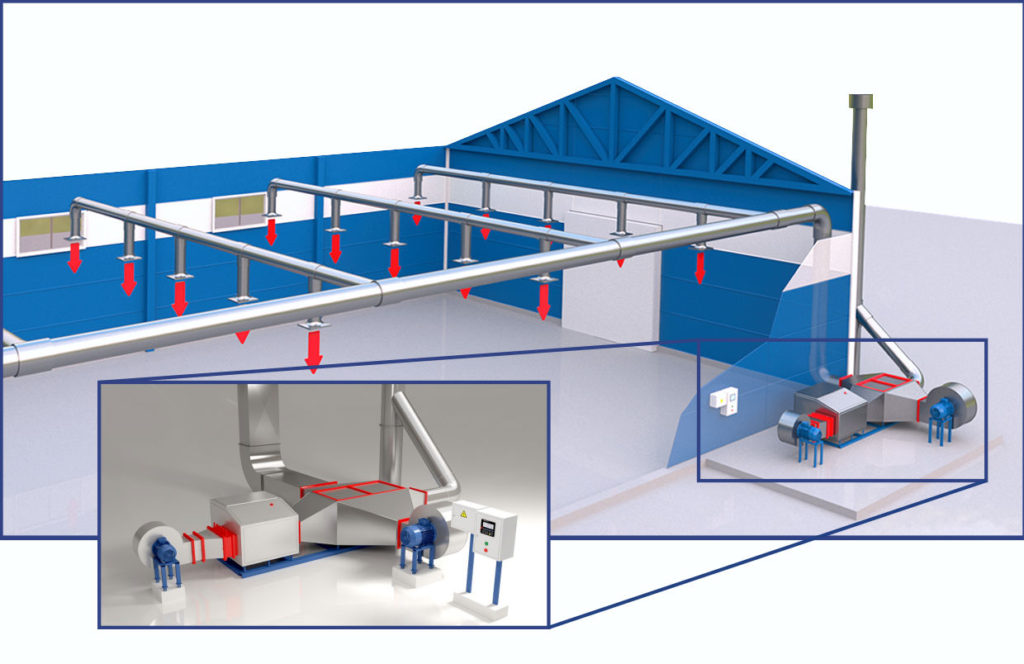Workshop heating system: what are the principles of creating a production engineering solution
When organizing heat supply for already built and new industries, it is not architectural delights that are of particular importance, but an interconnected project with effective engineering networks. Nevertheless, workshop heating system for existing structures can be selected from the proposed solutions. It will be as effective as in a new, technically sophisticated industrial building. Note that in such projects, attention is paid not only to useful heat supply. Technical heat also plays a large role in optimizing heat distribution.
Our company offers a universal solution that allows you to fundamentally reduce the cost of a kilowatt. This will allow the distribution of technical heat according to the optimal principle without unnecessary savings, which ultimately leads to more energy consumption and a decrease in comfort. Pellet burners FOCUS help to organize the heating system with a total capacity of up to 900 kWt... This is quite enough for heat supply of large-scale production, together with the organization of technical heat supply.
The main efficiency of the device - is it so?
The proposals of other manufacturers for the heating of the workshop mainly concern the installation of electric or water heaters, leaving the engineering networks of the enterprise without attention. This is due to the cost of major repairs and the laying of new communications. However, many businesses can afford to fully optimize their heating systems to meet modern requirements.
Manufacturers of industrial heating equipment, knowing the problem of production workers, try to offer "half-way" solutions. In particular, electric heating using heaters with efficiency 90%. But the rising cost of electricity is so high that electricity cannot be considered a profitable energy source. The installation of solar power plants is more costly than the full optimization of engineering networks in order to switch to granular fuel and pellet burners FOCUS.
For example, let's compare the prices per kilowatt when paying for several types of energy carriers - pellets, gas, electricity or even diesel fuel for production:
| Fuel | Calorific value according to standard | Required amount, 1 kW * h | Estimated fuel price | Fuel cost per kW |
| Main gas | 8.6 kWh / m3 | 0.116 m3 | 8.07 UAH / m3 | 0.936 UAH |
| Liquefied gas | 12.8 kWh / l | 0.0782 l | 11.60 UAH / l | UAH 0.907 |
| Wood pellets | 4.96 kWh / kg | 0.202 kg | 2,3 UAH / kg | 0,464 UAH |
| Diesel fuel | 11.1 kWh / l | 0.91 l | 15.80 UAH / l | UAH 14.37 |
| Electricity | — | 1 kWh | 1.68 kWh | 1.68 UAH |
The table shows the efficiency of using a source of thermal energy for production. The cheapest energy source is pellets. The most expensive is diesel fuel. Electricity is inferior to mains and liquefied gas. The benefit, according to manufacturers' assurances of infrared heat sources, lies in the technology that allows you to quickly heat the air and create a comfortable atmosphere using less energy.
The problem with electric fan heaters is the high cost of installation and limited service life, which, as a rule, does not exceed several years. For this reason, heating the workshop with fan heaters is obviously not effective. It is suitable for mobile production with high profitability.
Air heating system for pellet workshop
The features of heating premises for industrial production include rapidly cooling premises with a large cubic capacity. In this case, only air heating will be effective, which requires the installation of air ducts, allows you to organize general and local heating of workplaces.
Such a heating system can be deployed on the basis of an automatic pellet boiler room power up to 900 kW. This solution does not require the presence of people during operation, it is controlled remotely. At the same time, due to the cost of fuel, it is possible not to save technical heat, which affects the overall efficiency of heat supply. The built-in climate control system connected to the production SCADA allows for a dynamic heating mode. At the same time, maintaining the base temperature or supplying the so-called technical heat during the period of non-use of the premises.

